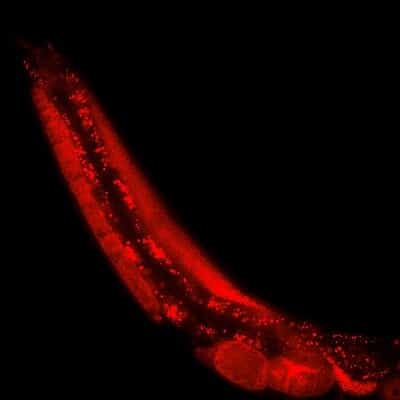Genomic imprinting is the process by which some genes are turned on or off based on whether our parents inherited them. Researchers at the Burga Lab found a new way genes are controlled, linked to silencing selfish genes. This discovery in Nature could explain the beginnings of imprinting’s evolution.
Alejandro Burga and his IMBA team and Eyal Ben-David’s lab at Hebrew University found the first parent-of-origin effect in nematodes. This discovery, published in Nature on March 6, 2024, sheds light on how some genes are silenced depending on whether they come from the mother or father. This process, called genomic imprinting, relies on DNA methylation, an epigenetic signal. Understanding these parent-of-origin effects is crucial for unraveling how genomic imprinting evolved millions of years ago.
Thirty years ago, IMP researcher Denise Barlow hypothesized that imprinting could be connected to defense systems against selfish genetic elements, such as parasitic DNA. This evolutionary struggle is between these components and their defenses.

Pinelopi Pliota made an exciting discovery while researching selfish genetic elements in the nematode C. tropicalis. She found that when the mother carries a particular feature, it poisons her eggs, ensuring its inheritance. However, when the roles were reversed, the effect vanished. This led the team to investigate how inheriting the element from the mother or father produces different outcomes, delving into the molecular basis of this parent-of-origin effect.
To understand the parent-of-origin effect, the Burga group studied the piRNA pathway, a defense mechanism against selfish genetic elements. They collaborated with Julius Brennecke’s lab and identified the piRNA molecules and proteins involved. However, more was needed to explain their observations. They realized maternal mRNA, loaded into eggs, was missing.
They demonstrated that the poison mRNA, expressed in the mother’s germline and loaded into the egg, is carried by the TA in maternal inheritance. The Burga group demonstrated that this mRNA identifies the TA as “own,” preventing the piRNA pathway from silencing it. “Gene expression is determined by the balance of this process, known as epigenetic licensing, with the piRNA pathway.”
Burga explains, “By default, the piRNA pathway will silence the toxin gene unless there’s maternal mRNA that licenses it by repressing the piRNA pathway. This inhibitor inhibition causes the toxin gene to be active and the eggs to be poisoned.”
The Burga group’s silencing effect persisted for several generations, affecting even great-granddaughters. This impact persists, unlike genomic imprinting, which resets with each generation. This discovery strengthens the evolutionary relationship between parent-specific gene expression and defense mechanisms.
It suggests that organisms lacking DNA methylation and canonical imprinting might have initiated this process. Though different in worms and mammals, this mechanism could be a first step towards more complex inherited silencing, eventually leading to genomic imprinting’s evolution.
In conclusion, the Burga Lab study provides crucial insights into the evolutionary origin of genomic imprinting. By uncovering the mechanisms underlying parent-of-origin effects in nematodes and tracing their evolutionary implications, the research contributes significantly to our understanding of this intriguing biological phenomenon.
Journal reference:
- Pliota, P., Marvanova, H., Koreshova, A., et al. Selfish conflict underlies RNA-mediated parent-of-origin effects. Nature. DOI: 10.1038/s41586-024-07155-z.
